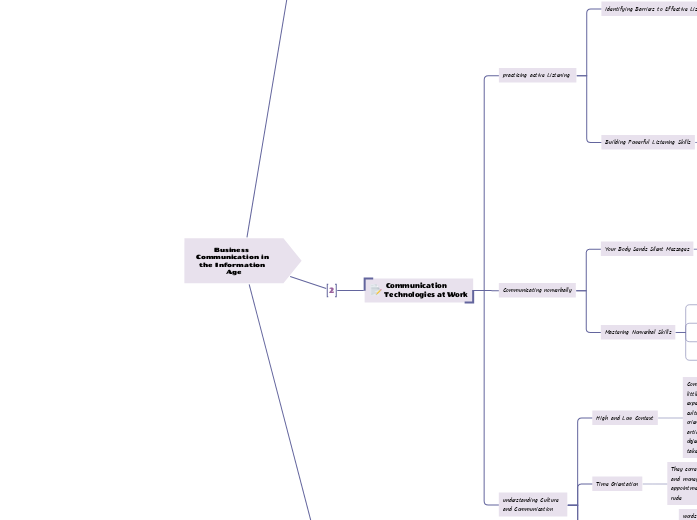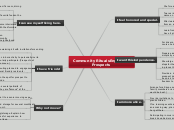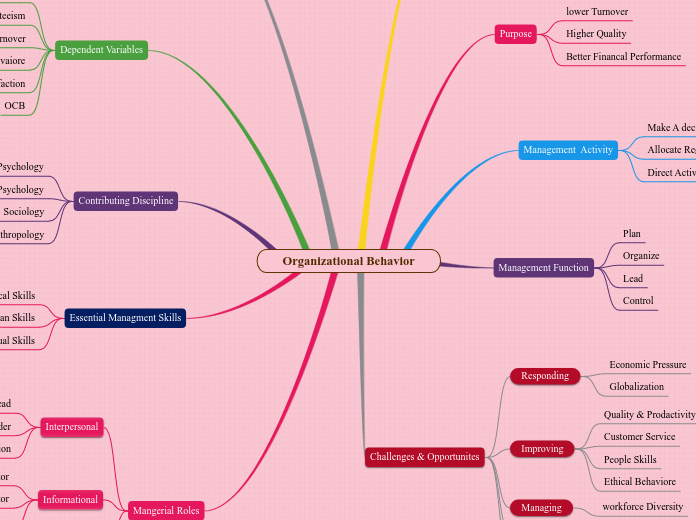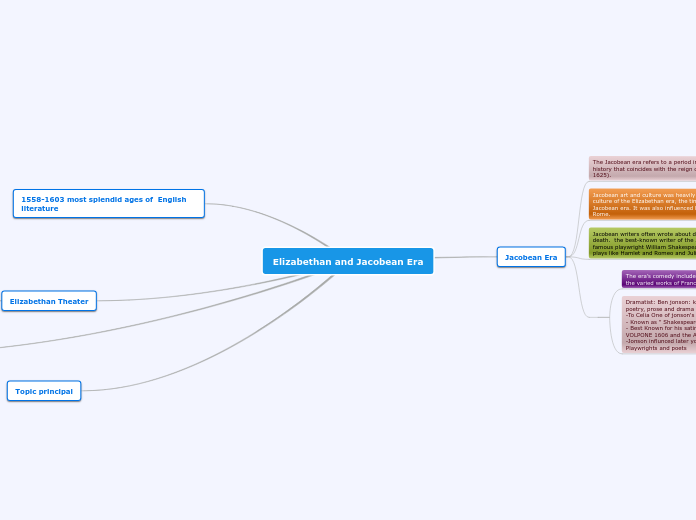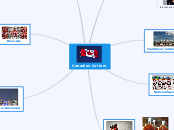Business
Communication in
the Information Age
Type in the title for your document into the Central Topic.
The title should reflect the subject and the purpose of the document.
Read more guidance and tips on using Mindomo to create documents.
Summary of Learning Outcomes
Master nonverbal skills by keeping eye contact, using posture to signal interest, reducing physical barriers, improving
your decoding skills, and probing for more information.
Culture can be described using key dimensions such as context, individualism, time orientation, power distance, and communication style.
Culture is a complex system of values, traits, ethics, and customs shared by a society; culture molds the way we think, behave, and communicate both offline and online.
Discuss how effective nonverbal communication can help you build your credibility
and advance your career.
Master nonverbal skills by keeping eye contact, using posture to signal interest, reducing physical barriers, improving your decoding skills, and probing for more information.
Understand that how you use time, space, and territory is interpreted by the receiver, who also reads the eye appeal of your business documents and your personal appearance.
Study nonverbal cues such as eye contact, facial expression, and posture that send silent, highly believable messages.
Describe how communication skills fuel career success in a challenging digital age
marketplace.
Employers expect new-hires and other employees to project a professional image and possess superior interpersonal skills, including oral and written communication.
Workers communicate more than ever; many collaborate in teams, which means that even technical fields require excellent communication skills.
SuIn an era of automation, augmented reality, and artificial intelligence, communication and other interpersonal skills can
future-proof well-trained workers.btopic
2
Communication
Technologies at Work
If you rely on external sources, you should reference them so that others can follow up.
There are many standards for referencing publications. A typical format is:
- Author name(s): surname and initials
- Year of publication
- Title of publication
- Publisher
- Page range
- URL, if available online
understanding Culture
and Communication
Power Distance
One important element of culture is power distance, The Power Distance Index measures
how people in different societies cope with inequality—in other words, how they
relate to more powerful individuals.
Communication Style
words are very important, especially in contracts and negotiations. People in high-context cultures, on the other hand, place more emphasis on the surrounding context than on the words describing a negotiation.
Time Orientation
They correlate time with productivity, efficiency, and money. Keeping people waiting for business appointments is considered a waste of time and rude
HIgh and Low Context
Communicators in low-context cultures depend little on the context of a situation and shared
experience to convey their meaning. Low-context cultures tend to be linear, analytical, and action oriented. Business communicators stress clearly articulated messages that they consider to be objective, professional, and efficient. Words are
taken literally.
Communicating nonverbally
Mastering Nonverbal Skills
Use posture to show interest
Interpret nonverbal meanings in context.
Improve your decoding skills.
Establish and maintain eye contact.
Your Body Sends Silent Messages
Facial Expression.To hide their feelings, some people can control these expressions and maintain so-called poker faces.
Eye Contact. Most of us cannot look another person straight in the eyes and lie. Good eye contact enables the message sender to see whether a receiver is paying attention, showing respect, responding favorably, or feeling distress.
practicing active Listening
Building Powerful Listening Skills
Adopt an empathic attitude. Effective listening requires empathy, the ability to understand other people’s perspectives and emotionally respond to their experiences
Stop talking. If you are the brash chatty type who dominates conversations, try to break the habit by letting others talk without interrupting.
Identifying Barriers to Effective Listening
Thought speed. Because listeners can process 450 words per minute, but in reality speakers talk about 125 to 175 words per minute, we can become bored and allow our minds to wander
Language problems. Unfamiliar words can destroy the communication process because they lack meaning for the receiver. In addition, emotion-laden, or charged, words can adversely affect listening.
Psychological barriers. Everyone brings to the communication process a unique set of cultural, ethical, and personal values. Each of us has an idea of what is right and what is important. If other ideas run counter to our preconceived thoughts, we tend to tune out speakers and thus fail to receive their messages.
1
Thriving in a Digital, Social,
and Mobile Workplace
The introduction to your document explains who it is for, and why it is important to them.
If you assume that your readers need some specific knowledge to be able to read and use the document, mention it here.
Succeeding With twenty-First-Century
Skills
Meeting the Challenges of the Information
Age Workplace
Remote work and 24/7/365 availability
Even before the COVID-19 pandemic forced 66 percent of U.S. employees to work from home at least part-time. high-speed and wireless Internet access had freed 30 percent of workers from conventional jobs in physical offices.
Disruptive technologies and social media
The new sharing economy (think Uber or Lyft) emerged thanks to platforms accessible with smartphone apps and have radically transformed whole industries. Airbnb has disrupted the hospitality industry. Social media continue to connect people around the world.
Why Communication and Other Social Skills Matter
the average employee spends almost 12 hours per week answering e-mails at the office
and another 5 hours from home. Work team members
can collaborate virtually, often across vast distances. In such a networked environment,
writing, speaking, and other professional skills count more than ever.
Communication Skills and Career Success
Superior communication skills will make you marketable in the workplace of the future regardless of the economic climate. When competition is fierce, excellent communicators immediately stand out. In poll after poll, communication tops recruiters’ wish lists. In one recent survey of job postings, written and oral communication ranked first among the five most desirable attributes in job seekers, ahead of management, leadership, problem-solving, and teamwork skills. Your ability to communicate is a stepping-stone to great job opportunities.
